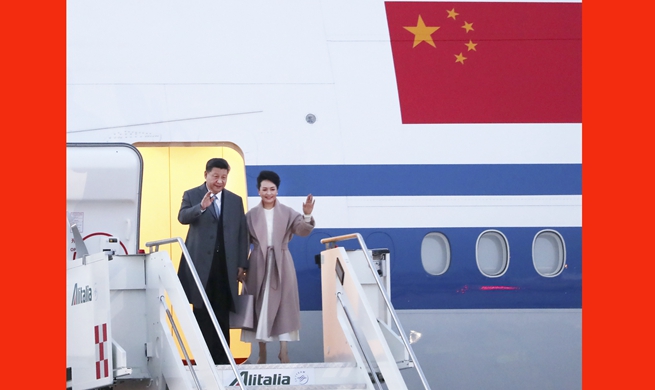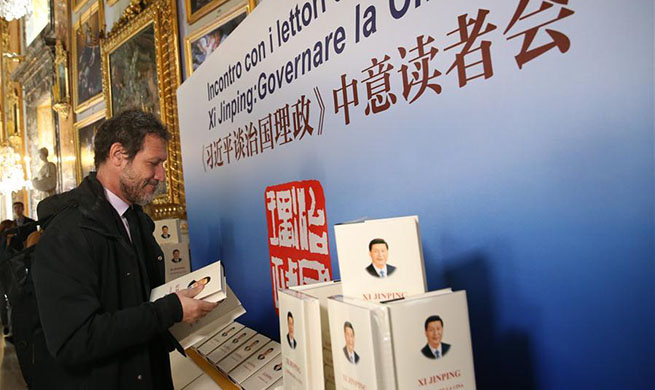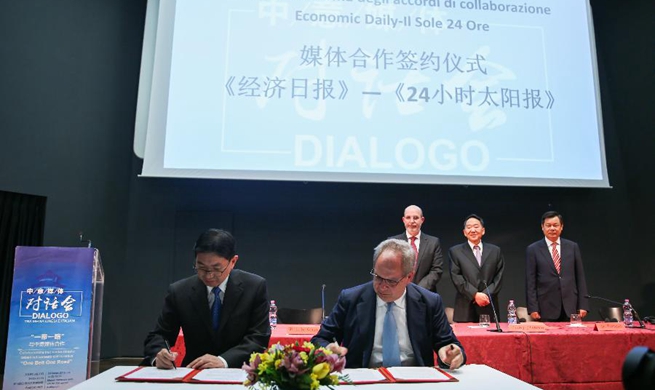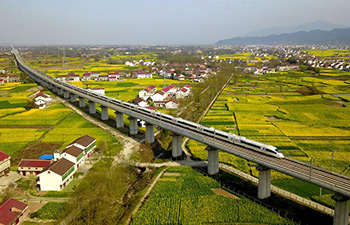BRUSSELS, March 21 (Xinhua) -- The European Union's (EU) 27 members unanimously agreed to offer a Brexit extension until May 22 if Britain's House of Commons approves the withdrawal agreement next week, President of the European Council Donald Tusk said on twitter Thursday.
If the withdrawal agreement that Britain reached with the EU is not approved next week, then the extension will go to April 12, said Tusk.
The EU 27 members (EU27) also approved the Strasbourg Agreement on Thursday and will continue no-deal preparations, said Tusk. The EU and Britain last week reached an agreement in Strasbourg, France, on legal assurances about the functioning of the backstop.
"April 12 is date for UK to decide to participate in the European election. If it hasn't done so by then, long extension is impossible," said Tusk during a following press conference.
Tusk said that the conditional extension could be approved by "written procedure" at the end of next week, so it would not require a reconvening of the summit.
Asked about the duration of a "long extension", Jean-Claude Juncker, president of the European Commission co-chairing the conference with Tusk, told reporters that a "long extension would mean until the very end."
British Prime Minister Theresa May arrived in Brussels Thursday afternoon to officially ask an extension for Brexit, which was due on March 29.
After a longer-than expected word trading with May, leaders of the EU 27 members stuck in a marathon discussion on whether or not to grant the extension as Britain required.
In an official conclusion published after the conference, the European Council reiterates that any unilateral commitment, statement or other act should be compatible with the spirit of the withdrawal agreement.
"The European Council calls for work to be continued on preparedness and contingency at all levels for the consequences of the United Kingdom's withdrawal, taking into account all possible outcomes," said the document.
In his invitation letter prior to Thursday's conference, Tusk said: "Prime Minister May's proposal, of the 30th of June, which has its merits, creates a series of questions of a legal and political nature."
"EU Leaders will need a concrete plan from the UK in order to be able to make an informed decision," he noted in a statement published on the European Commission's website.
British MPs last Thursday voted overwhelmingly to ask the EU for a Brexit extension in the troubled Brexit process.
Michel Barnier, the EU's chief Brexit negotiator, further questioned the motives of any extension Tuesday in a statement: "Does an extension increase the chances for the ratification of the Withdrawal Agreement? Will the UK request an extension because it wants a bit more time to rework the Political Declaration?"
If the answer is "no", he was concerned about the purpose and outcome of the British request for an extension.
"And how can we ensure that, at the end of a possible extension, we are not back in the same situation as today?" he said in the statement.
"Extending the uncertainty without a clear plan would add to the economic cost for our businesses but could also incur a political cost for the EU," said the chief negotiator, adding that the ball is now in London's yard.
Commenting on EU27's decisions, May said at a press conference that she welcomed "the Council's approval to the Northern Ireland Backstop which I agreed last week," adding that she is still planning to bring the vote back next week.
French President Emmanuel Macron told reporters Thursday that Britain faced a "true political and democratic crisis ... and there's no way we must be blocked in this situation," he was quoted as saying by media network Politico.
He said France was willing to "answer and set deadline," insisting that he "absolutely didn't want to hold a crisis summit in bad conditions," according to Politico.













